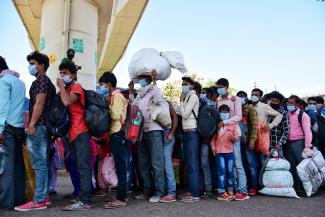Pandemic
Scientific mind-set versus covidiots

The deadly Covid-19 has spawned a new word for a new category of people: covidiot. Several leaders – political as well as religious – are fighting to enter its ranks.
- Kailash Vijayvargiya, the general secretary of the ruling Bharatya Janata Party (BJP), averred that Covid-19 could not harm a country that has “33 crore (3.3 million) gods and goddesses”.
- While organising an All Pakistan Sunni conference in Lahore on March 21, Muhammad Ashraf Asif Jalali, a Pakistan cleric, confidently asserted that “no one can get sick except as per the will of God” and should anyone get infected at the conference, the Pakistan government should “hang” him.
- Pastor Rodney Howard-Browne encouraged members of his Tampa, Florida-based megachurch congregation to shake hands (a few Sunday's back), proclaiming that his church would remain open because the Lord would keep Christians safe there.
Many others represent the face of obscurantism that is hurting the global fight against the pandemic. Fundamentalist forces have a vice-like grip on the hearts and minds of large swathes of the global population. Indians, for instance, have been under a communications assault insisting that the consumption of cow urine would provide a bulwark against the disease.
Jawaharlal Nehru, India’s first prime minister, declared the institutions of science and technology to be the “temples of modern India”. Since his time, a scientific mind-set has developed, and a far greater share of the people get a school education. Ever more people understand that Nehru’s temples are more reliable saviours than those of all religious denominations.
Nonetheless, retrograde beliefs are still alive, even among the educated elite. When today’s prime minister, Narendra Modi of the BJP, asked Indians to applaud doctors from their windows and balconies by clanging utensils, much of the country chose to convert it into a festival, moving out in large processions, ringing bells, beating gongs and making noise with all sorts of utensils. Those gatherings added to the nightmares of the medical profession.
On March 24, Modi announced a three-week national lockdown. However, his government did little to ensure that about 139 million migrant workers and their families, who make up 10 % of the population, could return home. Many have got stranded without jobs, shelter or food. Bus and railway stations are teeming with people trying to get home while others have started a long trek, walking home with no food or water. While state governments are trying their best and the civic community is helping, the problem is still serious. The police are helpful at times, but sometimes they harass the poor.
The situation in India's densely populated slums is critical too. Social distancing is hardly an option. Not every slum has running water moreover.
While the government obviously did not think through the lock-down, it is significant that Modi made a firm statement in favour of social distancing though there were some people in his Hindu-supremacist party who were planning religious festivities. At the same time, Pakistan's Prime Minister Imran Khan still opposes a nation-wide lockdown, though subnational authorities have become active. Pakistan has the highest figure of confirmed coronavirus cases in South Asia. Clerics oppose the limiting of mosque gatherings, and the government failed to adequately test and quarantine thousands of pilgrims returning from Iran.
Preventing the disease is even more important in South Asia than in richer world regions because health systems are much weaker. Italy has 3.2 hospital beds per 1000 inhabitants; India has 0.5. The situation is similar in neighbouring countries. So far, there is only minimal testing and an acute shortage of protective wear.
It is too early to say whether the Indian prime minister’s lockdown message to the nation – “Step outside in the next 21 days, and you set this country back 21 years” – came too late. Faced with the pandemic, however, Modi is finally turning to science. Nepal and Bangladesh have lockdowns too, Sri Lanka has a curfew. Will these measures be effective given various administrative shortcomings?
Aditi Roy Ghatak is a freelance journalist based in Kolkata. aroyghatak1956@gmail.com








